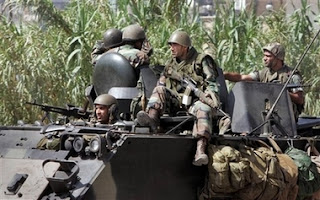The same lament I read about from Lebanese these days. This guy has the heart but sadly not the balls to put his money where his mouth his. The blame game on Syria is getting old.
Read the comments posted on this. People are constantly expressing sympathy for Lebanon but keep asking why they don't do anything about it [aside from complain].
One said something that echoed my sentiments...
hal_thresher wrote:
Mr. Abdul-Hussain,I am not sure why you think you should present this case to the American people. Do you want America to act like Syria and get involved in Lebanon's local politics. I think you need to return home and figure out what you can do to keep your country free of foreign interference.
6/14/2007 9:27:49 AM
---------------------
Here's what I think:
- I hope the U.S. doesnt waste their time supporting another investigation into this by releasing press, condemning Syria on how unjust this act was. At this point, it's got to be more than Syria; it's an equally corrupt Lebanese government.
- If many Lebanese outside of Lebanon comment on this with disdain and start condemning other countries again , they should first realize that talk will get them nowhere and they should fly back home and turn the situation around themselves by living home and straightening out their own constituency's weaknesses, instead of complaining and soaking up benefits that they originally sought after the civil war in 1975. Enough of the hypocrisy.
- As for Mr. Abdul-Hussain, yes you will prevail. When you start to accept the reality that your people equally deserve the blame for leading Lebanon into a downward spiral. There are just as many Lebanese who are prejudiced and hypocritical about the situation there. People who don't give a rat's ass about the Palestinian refugees; people who appreciate little of what U.N. workers within Unifil have been doing to help; people who are apathetic about peace and just want to retreat to the mountains; and people who just want to complain while they live abroad and do NOTHING but talk.
http://www.washingtonpost.com/wp-dyn/content/article/2007/06/13/AR2007061301982.htmlStanding Up to KillersSyria Must Answer for Its Murders in Lebanon
By Hussain Abdul-Hussain
Thursday, June 14, 2007; A27
A bomb in
Beirut yesterday
killed Walid Eido, a member of the Lebanese parliament, and his son, Khaled, one of the smartest, sweetest and most delightful friends I have ever had.
I should wait for the results of an investigation into the explosion to learn who killed Khaled and his dad. But I will not wait. I am tired of the murders in
Lebanon. I accuse the Syrian regime, headed by
President Bashar al-Assad, of killing Khaled. As a friend of the family, I want to press charges against Assad and his Syrian and Lebanese associates. Enough is enough with the Syrian regime and its Lebanese puppets.
Walid Eido was a member of the anti-Syrian parliamentary majority. Before his untimely death, the majority bloc comprised 69 of the legislature's 128 members. Now, the majority's margin has been narrowed to five, and there is no reason to believe that
Syria will not go after these people and kill them, one after another, until it forces the government to collapse.
For the past few months Eido had been the target of a demonizing campaign by Syria's foremost ally,
Hezbollah. Similar Hezbollah campaigns against other anti-Syrian lawmakers preceded their assassinations.
Hezbollah has been a supportive partner to Syria, often thanking the Assad regime for what it has "offered" my country. In truth, Hezbollah has sold out Lebanon's national interests to the regional autocrats of Syria and
Iran.
Hezbollah might not have started the streak of assassinations of anti-Syrian Lebanese politicians that began with the
killing of former prime minister
Rafiq al-Hariri in February 2005, but the militant group has certainly been complicit with the criminal Syrian regime.
Since Hariri's murder, we in Lebanon have seen the best of our politicians and journalists murdered, one after another.
Before Khaled's death, I had already lost one of my most inspirational friends, journalist Samir Kassir. He was
murdered by a car bomb on June 2, 2005.
Gebran Tueni, who had been my boss at the Arabic daily An Nahar, was
killed that December, also by a car bomb.
With each murder, we Lebanese have swallowed our anger and fought hard for an international tribunal, which the
U.N. Security Council approved last month. We hoped the tribunal would deter the Syrian regime and its Lebanese puppets from further killings. Yet a murderer is a murderer, with or without a tribunal, and the killings don't stop.
As I write these words, I understand that I am risking my personal safety. Speaking out could jeopardize my security during visits home.
But I owe it to Samir, Gebran and now Khaled to write this. I want to tell the Syrian regime and its Lebanese cronies that the Lebanese are willing to fight for their freedom despite the heavy cost.
And while I'm at it, I have some words for our Syrian brethren living under the tyranny of the
Damascus regime: Stand up for your rights and say no to dictatorship. Tyrants might kill some Lebanese politicians and throw other Syrian human rights activists in jail, but they cannot kill all of the Lebanese or imprison all Syrians.
We shall prevail. We shall prevail for Kamal Jumblatt, Rene Moawad, Rafiq Hariri, Samir Kassir, George Hawi, Gebran Tueni, Pierre Gemayel and all other Lebanese killed at the hands of the Assad regime. We shall stand up for the Syrian freedom lovers Anwar and Akram al-Bunni, Aref Dalila, Riad Seif, Mamoun Homsi and Kamal Labwani, among others, no matter how ruthless and ugly the Syrian dictatorship can get.
There will come a day when Lebanon is free and Syria democratic.
The writer, a media analyst, is a former reporter for the
Daily Star of Lebanon.

